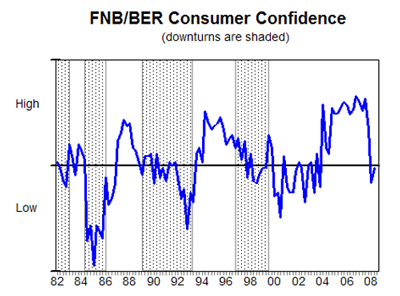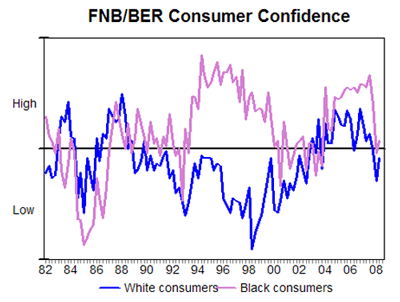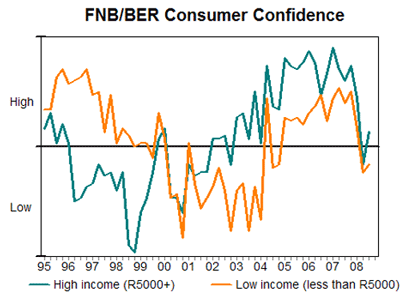
Top stories






More news

















Logistics & Transport
Uganda plans new rail link to Tanzania for mineral export boost








A reading of -1 indicates that consumers are neither optimistic nor pessimistic or that the optimists balance out the pessimists.
One should not get too excited by this recovery. At -1 consumer confidence is at its lowest level since the beginning of 2004 (when -7 was registered during 04Q1).
According to Cees Bruggemans, chief economist of FNB, the prolonged high consumer confidence levels of the past three years (2005-2007) appear to be something of the past, at least for the time being. “The 08Q3 rebound may be short-lived if it is a correction after the first half of the year overreaction. The 08Q3 results, therefore, most likely do not usher in a return to the high levels of the past”, said Bruggemans.
However, the 08Q3 results indicate that one should not yet write off the consumer. At -1 consumer confidence is still relatively high despite the cumulative 5 percentage point interest rate increase since 2006, tightening credit standards, falling house prices, eroding real income (due to surging petrol and food prices) and increasing uncertainty about employment, South African politics and the international economy. A level of -1 is close to the FNB/BER CCI's long-term (1982Q2 -2008Q3) average of +2.

The FNB/BER CCI is based on three questions, namely the expected performance of the economy, the expected financial situation of households and the rating of the appropriateness of the present time to buy durable goods (such as furniture, appliances, electronic equipment, vehicles and jewellery).
The 08Q3 rise in confidence can be attributed to a reversal in consumers' views on the economy and their own finances. However, they have further downgraded the present as an appropriate time to buy durable goods.

The confidence of high income consumers1 increased from -5 to +4 and that of low income consumers2 from -7 to -5.

Over the past few years, the easy availability of credit at banks, as well as furniture and clothing stores enabled the bottom end of the high income group and the top end of the low income group to acquire goods at a much faster pace than afforded by their income growth. The substantial tightening of credit standards following the rise in defaults and the introduction of the new national credit act (NCA) during mid-2007, as well as the substantial increase in debt service costs, have hit this so-called emerging middle income group hard. This group has to make huge, unpopular adjustments to their lifestyle, as they now not only have to service existing debt, but they also no longer have easy access to further new credit. No wonder that the time to buy durable goods sub-index of the lower middle income group (earning between R800 and R4,000 per month) registered the largest fall of all groups, namely 18 index points (from -3 during 08Q2 to 21 during 08Q3).
In conclusion: “In my view, the 08Q3 rebound in the FNB/BER CCI does not signal the end of the slowdown in consumer spending. I interpret the recovery as an interim revival, a typical occurrence during the downturn phase of consumer confidence,” said Bruggemans.
The 08Q3 survey indicates that consumers turned more optimistic about the economy and their own finances over the next 12 months, but that they regard the present as an even more inappropriate time to buy durable goods.
Consumer confidence will most likely resume its downward trend should consumers' optimistic expectations about the economy and their own finances fail to materialise. (The economic and household finances sub-indices will decline.) Such a development is most likely, given that the higher interest rate, tighter credit conditions, falling house prices and deteriorating international economy will dampen economic growth in South Africa with a lag in time. Consumers will consequently face increased uncertainty about employment and lower real income growth (as the tighter financial position of employers prevents them from fully compensating their employees for higher past inflation) during upcoming quarters, which will disappoint them and dent their confidence once more.
The fieldwork for the 08Q3 survey took place between 20 August and 4 September 2008 and the results were processed on 25 September 2008. Since the previous survey (conducted during May / June), the price of unleaded petrol at the coast increased from R9.22 per litre to R10.40 in July, before declining to R10.10 in August and R9.42 in September. The fieldwork was completed before a political settlement was reached in Zimbabwe, ANC president Jacob Zuma won his court case against the national prosecuting authority (NPA), Thabo Mbeki resigned as president of South Africa and the biggest financial crisis in the USA since the Great Depression deepened.
For more information, visit: www.fnb.co.za/economics
1. Defined as households with a monthly income in excess of R5 000.
2. Defined as households with a monthly income of less than R5 000.